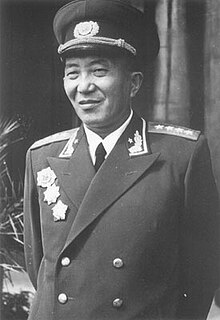Luo Ruiqing
Luo Ruiqing (born May 31, 1906 in Nanchong , Empire of China , † August 3, 1978 in Heidelberg ) alternatively Luo Jui-ch'ing was a high party official , political officer and army officer of the People's Liberation Army . From 1949 he was Minister of Public Security and Chief of Staff of the Armed Forces of China. He was deposed at the beginning of the Cultural Revolution and rehabilitated in 1977.
Origin and education
Luo Ruiqing was in Nanchong in the province of Sichuan born. He graduated from the Whampoa Military Academy established by the Kuomintang . In 1926 he joined the Communist Youth Association . He joined the CCP in October 1928.
Party activity
After a brief period of party work in illegality, Luo Ruiqing became a high-ranking political officer in the Chinese Red Army. He took part in the Long March . Here he served as chief of staff of the advance column . After the end of the Long March, he took over the post of Political Commissar of the First Red Front Army . From 1936 he also served as a lecturer at the Red Military Academy in Yan'an . After the Xi'an incident in December 1936, he and other high-ranking officials were part of the communist negotiating delegation to mediate the Second United Front . In the war against Japan he was involved in the formation of the 8th March Army , in which he held the position of political commissar from 1940. During the war he became known for his publications on party work in the military. After the end of World War II , he served as a political officer in the Jin-Cha-Ji military region in the resurrected Chinese civil war against the nationalists.
State Offices
After the communists' victory in the civil war, Luo Ruiqing became the first minister of public security. In the western press he was criticized for his role in the repression of political opponents in the service of the totalitarian state.
In 1956 he was of Mao Tse-tung to the Vice Minister of Defense appointed and in personal union as Chief of Staff of the People's Liberation Army. He was also given direct supervision of the military-industrial complex of the People's Republic. During his term of office, the first nuclear weapon test in 1964 was its greatest success. Together with Mao and Yang Chengwu , Luo Ruiqui was one of the proponents of a hinterland strategy. By withdrawing key industries and military installations into the interior of China, China could successfully wage a nuclear war against the Soviet Union or the USA . Due to dwindling health, Defense Minister Lin Biao handed over the daily management of the Central Military Commission to Luo Ruiqing. This fulfilled these in a specially created sub-committee. The Indo-Chinese border war also fell during his time as chief of staff .
In the course of the Cultural Revolution , Luo Ruiqing was deposed in December 1965. There was a charge of conspiracy against the Communist Party brought forward by other senior officers. During the 11th Party Congress, Luo Ruiqing was rehabilitated and received posts as a member of the CCP Central Committee and Secretary of the Central Military Commission .
He died in 1978 in West Germany , where he was due to medical treatment.
Individual evidence
- ↑ a b c d e f Dr. Matthew David Johnson: Luo Ruiqing in Xiaobing Li (Ed.): China at War - An Encyclopedia. Oxford, 2012 pp. 307 - pp. 249-251
- ↑ M. Taylor Fravel: Active Defense - China's Military Strategy since 1949. Princeton, 2019 p. 102
| personal data | |
|---|---|
| SURNAME | Luo Ruiqing |
| ALTERNATIVE NAMES | Luo Jui-ch'ing |
| BRIEF DESCRIPTION | Chinese general |
| DATE OF BIRTH | May 31, 1906 |
| PLACE OF BIRTH | Nanchong |
| DATE OF DEATH | August 3, 1978 |
| Place of death | Heidelberg |
